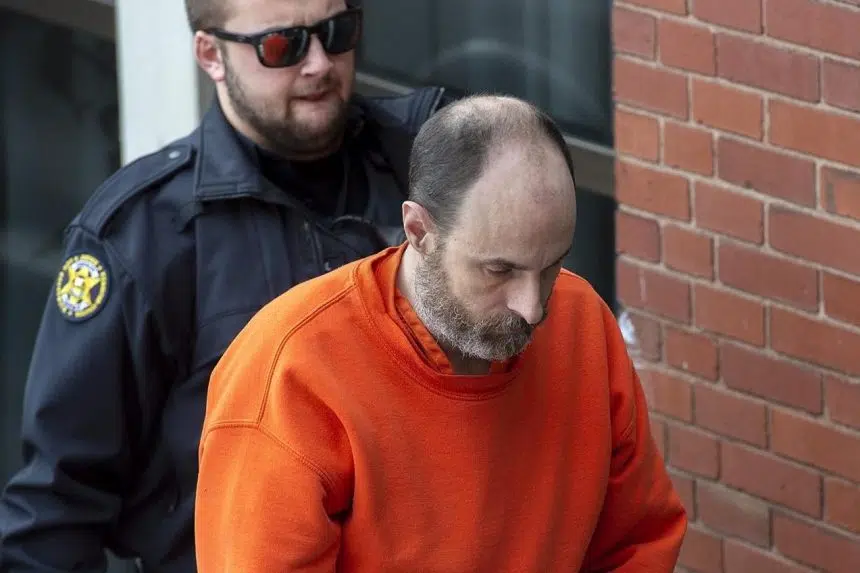FREDERICTON – The jury in the trial of Matthew Raymond has found him not criminally responsible due to a mental disorder for the 2018 killings of four people in Fredericton.
Family members of the victims hugged each other and sobbed after the verdict was announced Friday. Raymond bowed his head and wiped away tears but said nothing.
The 11-member jury reached its verdict after three days of deliberation. It brought to a close a nine-week trial that revived memories of a difficult time in the New Brunswick capital, a city known for its quiet, tree-lined streets and low crime rate.
The four victims left behind many grieving relatives, and the Aug. 10, 2018 shootings shocked the city. “Our hearts are broken,” Fredericton Mayor Mike O’Brien said at the time of the tragedy. “We grieve as one.”
The shooting is one of a trilogy of mass killing events that have shaken the normally tranquil Maritimes. In 2014, a shooter in Moncton, N.B., killed three RCMP officers and injured two. Then in April of this year, a gunman in Nova Scotia killed 22 people and injured three – the deadliest such rampage in Canadian history.
The Fredericton police constables who died were Robb Costello, 45, a husband with four children, and Sara Burns, 43, a wife with three children. They were the first officers to arrive at the scene of the early morning shooting and were shot as they rushed to help two people lying on the ground.
The two on the ground likely were dead when the officers arrived. Bobbie Lee Wright, 32, whose nickname was Bubbles, and Donnie Robichaud, 42, were shot as they packed their car in the parking lot of the apartment complex. A relative said they were going to go zip-lining after work. The two had just recently started dating.
Autopsies of the victims presented at trial show all four victims were shot at least once in the head. Some were shot multiple times in the body as well as in the head.
Police officers testified that the shots came from the window of Raymond’s third-floor apartment that was part of the four-building housing complex. They described how Raymond was shot in the abdomen by police before officers stormed the apartment and arrested him.
Raymond has fully recovered from the injury.
Police said they seized a semi-automatic SKS rifle, a shotgun, about 2,000 of rounds of ammunition and a knife from Raymond’s apartment. They also found 22 spent casings and seven spent shotgun shells in two different rooms.
There was never any doubt that Raymond was the shooter. The key question for the jury revolved around his mental disorder and whether it rendered him not criminally responsible.
During the trial, evidence taken from Raymond’s computer and other material found in his apartment revealed his deepening involvement with conspiracy theories, hoaxes, religious beliefs about end times and numerology. From 2017 until the shooting in 2018, his mental deterioration was marked by bizarre beliefs about demons masquerading as political leaders and celebrities, about the earth being flat and about a coming apocalypse.
Two psychiatrists who testified told the jury that Raymond had a mental disorder – one said it was schizophrenia and the other said it was a delusional disorder.
“Matthew Raymond was suffering from a disease of the mind at the time he committed these acts,” Justice Landry said in his charge to the jury.
Both the judge and lead defence lawyer Nathan Gorham told the jury that if they found Raymond not criminally responsible he would be imprisoned in a medical institution attached to a penitentiary.
“We’re not talking about him being released,” Gorham said, explaining that he would be institutionalized indefinitely and subject to regular reviews to assess his mental condition.
The defence argued the mental disorder rendered Raymond incapable of understanding the nature of his actions. Crown prosecutors said the delusions he was suffering from waxed and waned and were not intense enough to prevent him from understanding that he was shooting humans, and that it was wrong.
Fredericton police Chief Roger Brown said his thoughts are with the families of the victims and of the accused, as well as with the entire police force.
“I thank the jury for their time and deliberations and am fully aware that no one has emerged from this situation unscarred,” he said in a news release Friday. “It is important that we respect the decision that has been passed down as we move forward.”
The province said it was the first jury trial to be held in Canada since the COVID-19 pandemic began. The trial was held in a downtown convention centre with the seats widely spaced. Only media and family members of the victims were allowed to watch the proceedings.
COVID tests for some participants slowed down the trial, as did procedural issues, including a defence request for a mistrial early on that was denied. One member of the jury was dismissed in October after he was spotted playing sudoku.
Chris Morris, The Canadian Press











